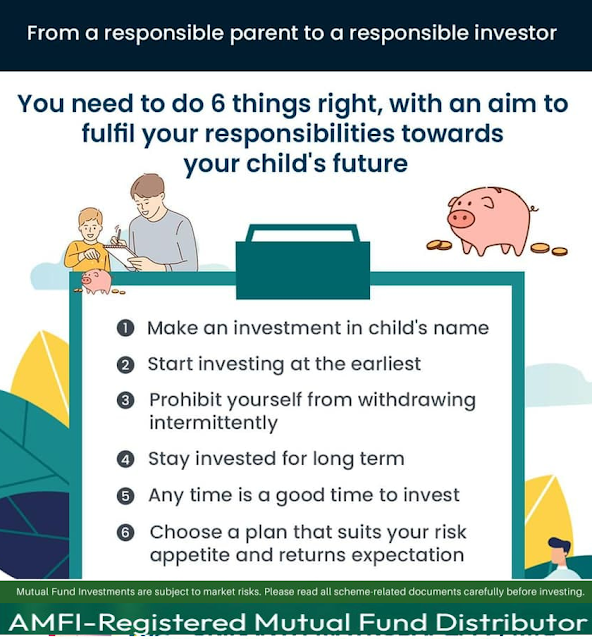Congratulations on
the birth of your angel-like child! It is natural to start dreaming about their future, and you, like all parents dream of your child becoming a doctor, CA, scientist, or engineer.
I often meet with parents who are worried about the cost of
college. Yes, it’s a hard-hitting reality that college fees are rising
every year, and student loans can have a lasting impact on your children’s
financial well-being. That’s why it’s important to plan and save early for
their education.
The good news is that there are several ways to save for college, and even small amounts of money can add up over time.
Saving early is critical for your children’s education. By starting to save right after your child is born, you can have enough time to build a substantial fund for their graduation and higher studies. You can also benefit from the power of compounding, which means your money grows faster over time as it earns interest on interest.
Here are simple steps to have a stress-free LOAN LESS Education for your beloved child.
ESTIMATE THE FUTURE COST OF
COLLEGE EDUCATION COST:
The first step in planning for
your children’s college education is to find out how much it will cost in the
future and actually the trickiest part.
Make use of the innumerable online resources like College Fees Calculator and
do not forget to consider the effect of inflation on the fees. To be even more
specific, add the Boarding fees, travel expenses, and tuition fees without fail.
DEVELOP AN EFFECTIVE SAVINGS PLAN:
Now that you know HOW MUCH you
need, start a savings and Investment Plan to achieve the Education Expenses
Goal. Saving a little bit every month can make a big difference in the
long run. The earlier you start saving, the more time you must benefit from the
power of compounding. Compounding is when your money earns interest, and
then your interest earns interest, and so on. This way, your money grows faster
and faster over time.
For example,
if you save ₹1,000 per month at a 12% annual interest rate, you will have ₹15.6
lakh in 10 years,
₹67.3 lahks in 20 years, and
₹2.9 crore in 30 years.
But if you start saving 10 years later,
you will only have ₹57.3 lakh in 20 years, and
₹1.4 crore in 30 years.
That’s a huge difference and underscores the huge impact of starting early.
INVEST IN THE RIGHT ASSET CLASS:
Navigate the array of savings options
tailored to the Indian context, including options like the Public Provident Fund (PPF), Sukanya Samriddhi Yojana (SSY), Equity-Linked Savings
Scheme (ELSS) & ULIPs.
Striking a good balance between capital safety
and returns is an important consideration for any investor.
It is important to note that every savings
option has its own pros and cons. It is important to carefully
consider your individual needs and financial goals before choosing a savings
option. It is also a good idea to
consult with a financial advisor to get personalized advice.
Rebalancing your portfolio
Over time, the performance of
different asset classes can vary. This can cause your portfolio to become
unbalanced, meaning that it no longer reflects your desired risk tolerance and
investment goals. Rebalancing your portfolio involves selling some of your
winners and buying more of your losers to bring your portfolio back into line
with your desired asset allocation.
Increasing or decreasing your investments
As your financial situation
changes and your goals evolve, you may need to increase or decrease your
investments. For example, if you get a raise at work, you may decide to
increase your contributions to your retirement account. Or, if you are
approaching your child's college tuition deadline, you may decide to start
decreasing your investments in stocks and moving more of your money into debt
funds.
Moving to debt funds as you approach your investment goal.
As you get closer to the year when you need your investment, it is important to start moving your money into debt funds. Debt funds are less volatile than stock funds, so they can help to protect your capital.
MAXIMISE TAX BENEFITS:
Numerous Savings & investment plans
offer tax advantages. Explore options like the Equity-Linked
Savings Scheme (ELSS), Public Provident Fund (PPF), ULIPs and National Pension
System (NPS) to qualify for tax
deductions. Use these to maximum effect and leverage your savings.
These tax benefits help you reduce your outgo towards taxes and increase
your savings.
DON’T FORGET ABOUT SCHOLARSHIPS & GRANTS:
. There are several scholarships and grants available to help
students pay for college in India. Along with you, make sure
your child joins you in searching for
and researching various scholarships and grants that are available.. Many
schemes like
National Talent
Search Examination (NTSE)
Kishore
Vaigyanik Protsahan Yojana (KVPY)
Dr. APJ Abdul
Kalam Global Skills Scholarship
Start with your search early,
check with your school/college,
Talk to your teachers and education counselors.
Children’s education is a non-negotiable
goal.
Planning it earlier can give you more options and flexibility for your child’s
education. You can choose the best college, course, and career for your child,
without worrying about the financial burden.
Saving
for college can be a daunting task, but it is worth it in the long run. By
starting early and following these tips, you can help your children pursue
their college dreams without the stress of student loans.
So,
my dear friends, fret not… it's relatively
easy if you follow the above tips and make sure you stick to them same.
All the very best,
Srikanth Matrubai
Author – Don’t Retire Rich
Qualified
Personal Finance Professional
Regards,
Srikanth Matrubai
https://t.me/joinchat/AAAAAELl4KUnaJzi-JJlDg/









